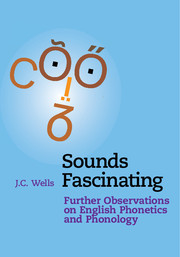14 - EFL
from PART III - APPLYING PHONETICS
Published online by Cambridge University Press: 05 September 2016
Summary
Institutionalized Mispronunciations
Many non-native speakers of English believe that comfortable is pronounced with -eɪbl̩ at the end, just like table. Native speakers, on the other hand, know that it has a weak vowel, -əbl̩, like other words with the -able suffix (conceivable, perishable, preferable).
This seems to be not so much a personal error of this or that EFL speaker, but an institutionalized mispronunciation passed on from teacher to learner and between learners (I've noticed it particularly among Polish EFL learners).
There are other comparable cases. I am not referring to general errors of pronunciation such as difficulties with this or that sound, but to lexically-specific errors affecting particular words in the vocabulary. (By the way, would that be pɑː-ticular? No, pə-.)
Many EFL learners seem to believe that clothes is pronounced as two syllables, ˈkləʊðɪz or the like. But native speakers pronounce it as one syllable, either kləʊðz as I think I usually say it myself, or simply kləʊz, i.e. as a homophone of close (v.).
Another institutionalized oddity, which I associate particularly with Germans, is saying evening (the time of day) with three syllables, ˈiːvənɪŋ, rather than with the two that native speakers normally use, ˈiːvnɪŋ. (Judging by the Old English spelling ǽfnung, this word has been disyllabic in native English for over a thousand years.)
And then there's aɪˈdiː for idea, frequently heard from people whose first language is French. But we native speakers say aɪˈdɪə, or in some cases aɪˈdiːə.
It's the spelling, stupid.
English r
An Arabic-speaking EFL learner wrote to ask about English r: ‘Where should we pronounce r and where not? What are the rules?’
What advice should one give? It all depends.
• For a simple life, and if your model is American English, pronounce r wherever the letter r is written.
• However, if your model is RP or a similar form of BrE, or Australian or New Zealand English, or to fit in with those around you in Africa (for example), then you should pronounce an r-sound only if the sound that follows is a vowel sound.
- Type
- Chapter
- Information
- Sounds FascinatingFurther Observations on English Phonetics and Phonology, pp. 151 - 156Publisher: Cambridge University PressPrint publication year: 2016

